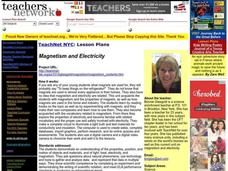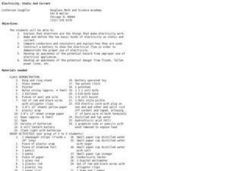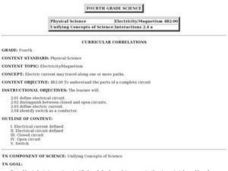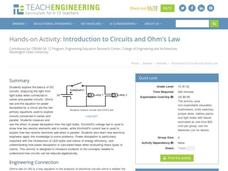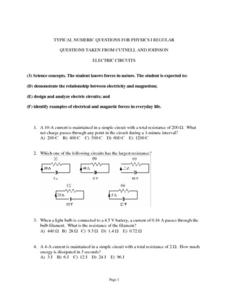Curated OER
Electric Circuits
Fifth graders build a simple circuit which transmits Morse code using a battery, bulb, wire, switch, and tape. They analyze problems that arise while transmitting their messages to each other.
Curated OER
The Electric House Project
Students design and build a foam core house which has a light in each room. They demonstrate an understanding of series, parallel, and complex circuits. They complete a worksheet, in complete, sentences expressing these electrical concepts.
Curated OER
Magnetism and Electricity
Students demonstrate a comprehension of the properties, position, and motion of objects and materials, and of light, heat, electricity, and magnetism. They use materials to assemble an electric circuit and test materials, including...
Curated OER
Electrical Circuits And Switches
Students design and draw circuits with batteries, small light bulbs and common household conductors. They build and test the circuit then modify it so someone who couldn't use their hands could turn the circuit on and off.
Curated OER
Mystery Card 3
Students will make a circuit on a mystery card. They will connect wires, bulbs, and battery to form an electrical tester. After students learn how to make one following the directions, they can create their own mystery card by...
LABScI
Circuits Lab: Lightbulbs
Electrons flow from negative to positive, but the general consensus is that current flows from positive to negative. Scholars explore current through construction of circuits in both series and parallel. The focus is on voltage,...
Curated OER
Flick the Switch
After reading a short paragraph on how electrical switches work, learners look at four examples of electrical circuits, and circle the ones which will allow a lightbulb to be lit. This would be a good precursor to having your charges...
Curated OER
Series and Parallel Circuits
Fourth graders explore electrical circuits. In this electrical circuit lesson, 4th graders research the history of the use of light and read a biography regarding Benjamin Franklin. Students the build basic circuits, series circuits and...
Curated OER
Electricity: Static and Current
Young scholars investigate static and current electricity. For this electricity lesson plan, students observe 4 demonstrations and conduct 3 activities to explore the repulsion of electrons and the attraction of protons and electrons....
Curated OER
Inventions: The Impact
Students recognize that inventions are developed to fill a need.In this inventions instructional activity, students become familiar with the inventing process and create simple inventions. Students complete a worksheet about their...
Curated OER
Conductors and Insulators
Fifth graders investigate conductors and insulators by testing their hypotheses. They use copper wire and batteries to light a bulb. They use a penny and a plastic spoon to determine which is an insulator and which is a conductor.
Curated OER
Paths of Electrical Currents
Fourth graders examine the paths that electrical currents travel. They create a current of electricity using flashlights, bulbs, batteries, wires and tape. They determine how to create a closed circuit that will light the bulb. They...
Curated OER
Circuits
Fifth graders discover the differences between parallel and series circuits. They draw and construct the two types of circuits using wires, bulbs, batteries, sockets, and switches.
Curated OER
Solar Kit Lesson #1 Solar Cell Inquiry
Students use a selection of solar panels, lamps, motors, and an AA battery to get as many motors or lights to operate as they can in an allotted time period. For each successful arrangement, they draw a diagram of their setup, label the...
Curated OER
Making Energy "trails"
Students explore ten different stations that demonstrate either chemical, kinetic, or mechanical energy. They examine the way energy is transferred during each station's hands-on activity. Stations include vinegar and baking soda,...
Curated OER
The Little Orange Rooster
Third graders brainstorm a list of heat sources they are aware of. After listening to a story, they identify the different types of machines mentioned and sort them based on whether they run on gasoline or electricity. To end the...
Curated OER
Binary Numbers
Students explore how a battery-powered light box demonstrates how to transmi timages.
Curated OER
Circuit Boards
Pupils explore circuit boards. They determine that a complete circuit is needed to light the bulbs, experiment with the boards to develop strategies for finding where the hidden connections are, and develop strategies that can be used to...
Curated OER
Circuit City
Fifth graders are introduced to the concept of circuits and how electricity works. In groups, they design their own subdivision with houses in which they have inside and outside light sources. To end the lesson, they make the circuits...
Virginia Department of Education
Metals, Nonmetals, and Metalloids
How can one easily classify metals, nonmetals, and metalloids? Pupils answer this question as they experiment with unknown substances and perform tests on conductivity, brittleness, and malleability to determine which unknown belongs in...
Teach Engineering
Introduction to Circuits and Ohm's Law
Take a very basic understanding of circuits and develop a strong understanding of the parts and function of a circuit. This activity is developed to be an independent exploration of circuits from the basics to series and parallel models....
Curated OER
Amazing metals: Nevada quarter reverse
Nevada's nickname is "The Silver State" and metal is what this lesson is all about. Pupils will make a T-chart to discuss the differences between metals and minerals, then write and explain the properties of metal. They will get into...
Curated OER
Typical Numeric Questions for Physics I - Electric Circuits
A collection of 15 practice problems, most of them involving circuit schematics, is provided for your physics class on this handout. Learners are to compute the net charge, resistance, energy, or power dissipated for different...
It's About Time
Response Time
How fast are your reactions in the case of an emergency? Young scholars complete many activities including: time estimation, building a circuit, multiple reaction time experiments, and graphing.




